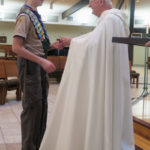
Election Day — Nov. 8 — is just 40 days away. Let’s take a break from divisive political ad campaigns to spend time with resources such as Faithful Citizenship for Iowa Catholics and to participate in legislative forums and public gatherings of candidates at all levels of government. No one should tell us how to vote. We have a responsibility to learn about candidates for state and congressional seats and the issues they will consider if elected.
Faithful Citizenship for Iowa Catholics contains a message from Iowa’s bishops, bullet points on a properly formed conscience, a list of legislative principles and information on voting. The Iowa Catholic Conference, the public policy voice of Iowa’s bishops (iowacatholicconference.org) produces this neutral and useful resource available in English and Spanish on its website, Facebook and other social media. The resource also provides a link to the U.S. Conference of Catholic Bishops’ Forming Consciences for Faithful Citizenship (https://tinyurl.com/yc6ux4tp).
“Catholics have a serious responsibility to form their consciences, in light of the teaching of Jesus Christ, to judge how to take action on behalf of the unborn, the poor and the vulnerable,” the Iowa Catholic Conference (ICC) resource states. A list of candidates at the state and federal level is available at sos.iowa.gov. We should ask candidates running for state office if they support:
• Protection of human life in all stages from conception until natural death.
• Enhancing support for new mothers and children.
• Providing additional state financial support for students to attend a nonpublic school.
• Special consideration for the needs of people who are poor and/or vulnerable.
• Supporting measures to protect and improve the quality of water, air and land in Iowa.
• Recognizing the right of people to practice their faith and to serve society in a manner consistent with their beliefs.
• Maintaining Iowa’s status as a “no death penalty” state.
While considering candidates for Congress, we should ask them if they oppose:
• The U.S. Department of Health and Human Services’ proposed Section 1557 rule. This rule would consider as discrimination a health care worker’s objection to perform gender transition procedures, whether that objection is a matter of religious belief or clinical judgment. The proposed regulation could also suggest that HHS may ultimately determine that Section 1557 imposes similar requirements with regard to abortion, according to the USCCB.
• The “Respect for Marriage Act,” which would prevent states from restoring the authentic understanding of marriage between man and woman if given the opportunity by the Supreme Court.
Ask congressional candidates if they support:
• The bipartisan Afghan Adjustment Act (S. 4787/H.R. 8685), patterned after similar laws, including legislation enacted after the U.S. withdrawal from Vietnam. This bill provides an important correction by allowing recently resettled Afghans to apply to become lawful permanent residents.
• Deferred Action for Childhood Arrivals (DACA) program, which provides work authorization and temporary protection from deportation for certain undocumented individuals brought to this country as children. However, DACA does not provide these individuals, known as Dreamers, with a pathway to citizenship. The uncertainty they live with is the result of politics over people.
• The Pregnant Workers Fairness Act (S. 1486) would make the workplace safer for pregnant workers and their unborn children by requiring employers to provide pregnant employees with reasonable accommodations.
• Protection of houses of worship by adequately funding programs such as the Nonprofit Security Grant Program. Physical attacks against churches, synagogues and other houses of worship prompts the need for this support.
These are just a sampling of issues to address with candidates for elective office on Nov. 8. In our discernment of issues and candidates, we need to keep in mind the seven principles of Catholic Social Teaching (https://tinyurl.com/2p84c79j):
• Life and Dignity of the Human Person.
• Call to Family, Community and Participation.
• Rights and Responsibilities.• Option for the Poor and Vulnerable.
• The Dignity of the Work and the Rights of Workers.
• Solidarity.
• Care for God’s Creation.
Our Church teaches that every person “has a fundamental right to life and a right to those things required for human decency. Corresponding to these rights are duties and responsibilities — to one another, to our families, and to the larger society” (Themes of Catholic Social Teaching). An essential element of our duties and responsibilities is to vote — and to prepare ourselves to do so as faithful citizens.
Barb Arland-Fye, Editor
arland-fye@davenportdiocese.org











